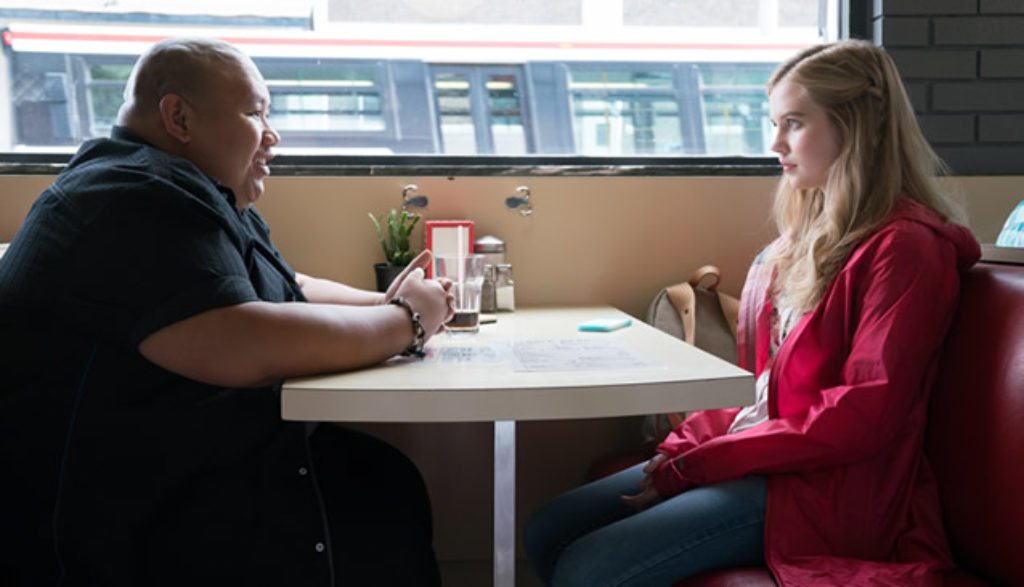
Rhiannon is your typical 16-year-old high schooler just trying to enjoy life. But her boyfriend, Justin, makes this a bit hard. Ya’ see, he’s kind of a jerk.
He doesn’t care about the music she likes, what she wants to eat or really anything about her. She would probably do something about it, but she feels a bit trapped, like there are no other options.
Until one day, Justin surprises her with a trip to nearby Baltimore. They hold hands, kiss and talk about everything under the sun. But when she approaches him the next day, he can’t remember a thing. How is this possible, you ask?
Well, it’s because a spirit, by the name of A, had temporarily inhabited Justin’s body. But not on purpose. You see, A has no choice but to wake up every day as a being who is “always the same age, never the same person twice.”
And it seems that no matter who A awakens as, be it male or female, the spirit still has deep feelings for Rhiannon. Soon, Rhiannon feels the same.
As the two fall in love, they realize that loving someone who is externally a different person every day is far more difficult than they expected. And now they must decide if it’s possible to live the rest of their lives together.
Rhiannon is treated poorly by her boyfriend, Justin. But the day after A inhabits her (more on that below), she wakes up in a determined frame of mind, breaks up with Justin and begins to value herself and her own interests. This burst of courage has been a long time in the making.
A helps Rhiannon see that she is interesting, valued and loved. Rhiannon, in turn, tells A that she loves it—A is apparently a genderless being, hence the it—not because of the various bodies A inhabits, but “because you’re you.”
A tells Rhiannon, “The day we met, I felt something I’ve never felt before.” Rhiannon consoles A, saying that it must be lonely to be always hopping from body to body. And the two of them discuss how A never knew its parents or where it came from.
Rhiannon learns to be vulnerable around A and reveals that her mother is a hard worker and dedicated parent. She also opens up about her father and her home life. At one point, A actually inhabits Rhiannon herself, and the spirit (working through Rhiannon) makes plans to help her family draw closer together. Rhiannon confronts her mother, who is cheating on their father. But instead of condemning her, Rhiannon tells her that everyone changes, and asks that she work to make their marriage last.
For its part, A decides that every day it inhabits a new person it will work to give that person the best day ever, making sure he or she knows they’re loved and valued, and appreciating what makes them unique. A inhabits a number of adolescents with hard struggles: a blind boy, an Asian girl who struggles with suicidal thoughts, a young black boy whose parents heavily restrict him and many other people. A also decides not to stay in any person’s body for too long because it will take away from the life that person is living.
That said, he makes an exception with the Asian girl, staying two days in order to help her father understand how deep his daughter’s suicidal struggles are. In doing so, the film makes a strong anti-suicide statement, and it simultaneously emphasizes the importance of parents in helping their children with this difficult issue.
Overall, the film places a strong emphasis on love and the importance of a strong family unit.
A Christian boy named Nathan is taken over by A, and the next day he claims it was Satan, saying, “The devil made me do it,” and, “I was on Satan’s social media.” He agrees to speak with Rhiannon about the incident, telling her, “I’ll meet with anyone interested in the truth.” (Their conversation is interrupted by a reverend.) Nathan is depicted as a fairly typical Christian (he wears a cross, listens to Christian music and is willing to talk about his faith); but that characterization also glosses over the fact that he’s the only character with enough spiritual discernment to realize what may have happened to him. In doing so, the film lightly minimizes a Christian worldview when it comes to significant spiritual realities.
A’s spiritual existence, meanwhile, is never explained. A is a spirit who takes over its human hosts in a way that could be said to resemble something like possession. That said, the film never goes anywhere near that kind of explanation or depiction of A as an evil spirit being. And unlike malevolent demonic possession as we usually think of it, A’s intent toward its human hosts is, in contrast, benevolent.
Good intentions notwithstanding, however, the suggestion of a spirit being moving from person to person, host to host remains an idea that’s at odds with a Christian understanding of personhood and spiritual reality. And it could be confusing to those who aren’t well-grounded in what they believe about spiritual things.
Every Day gives us a gender-blurring love story that suggests the possibility of a separation between a person’s biological sex and his or her internal sense of gender identity.
A, for example, tells Rhiannon that “not everyone’s body aligns with their mind.” Rhiannon asks A when it found out it was different, to which it responds: “I didn’t figure out I was different until I was six.” Rhiannon and A have a conversation in which A tells her that anyone “can be attracted to way more people than one.” Rhiannon asks A, “Do you consider yourself a boy or a girl?” To which A responds, “yes,” an answer that undermines an understanding of gender as a binary male/female reality.
Rhiannon and Justin kiss a few times. More than once, he asks her to “come over to my place,” and it’s clearly implied that they used to have sex more frequently. When she refuses at one point, Justin says, “You used to like that.” She tells him, “Your mouth tastes better when you don’t smoke.” Justin asks Rhiannon if she’s having her period, to which she responds sarcastically, “Congratulations, you’re not a father.” Justin also tells her “you look sexy” numerous times, apparently in the hope that she’ll get more physical with him again.
We see A and Rhiannon kiss multiple times, hold hands, lay with one another and get physically close, when A is inhabiting both boys and girls. (One scene shows Rhiannon kissing another girl who’s inhabited by A.) A and Rhiannon get away for a weekend to a secluded cabin; it’s insinuated that they go further than just kissing, as she’s shown in a bra and A inhabits a shirtless young man.
Rhiannon often wears semi-transparent tops, revealing her bra. She’s also seen in a bikini top, her bra and short-shorts. When A eventually inhabits Rhiannon herself, it apologizes profusely when it sees her naked in the shower. (Though the camera itself doesn’t reveal what A sees.)
When A inhabits one particular boy’s body, another guy sitting close by tells Rhiannon, “I’ll take this guy if you don’t want him.”
Rhiannon’s sister tells her that their mother is having an affair. Her sister also quips, “Keep your panties on.”
Justin throws a rock at someone’s car. Rhiannon’s sister is a reckless driver, often putting them in harm’s way. Justin hits a friend when he calls Rhiannon a “slut.” A girl has marks on her arm from cutting herself, and her notebook is filled with the ways she plans on committing suicide. Someone plays a violent video game.
Ten s-words. Five misuses of God’s name, at least one of which is paired with “d–n.” Other profanities include “dumba–,” “d–n” and “b–ch.” We hear a crude euphemism for the male anatomy twice. Other verbal put-downs include “stupid” and “douchebag.” Rhiannon is called a “slut” numerous times. We see two crude hand gestures.
Justin smokes cigarettes. Rhiannon and Justin attend a party where they drink and play beer pong. Justin thanks Rhiannon for driving so he can get “super wasted.”
Justin treats Rhiannon poorly, taking advantage of her kindness and dismissing her interests. He tells her, “I’d fight like crazy not to lose you,” but only after she asks him if they really have an emotional connection. Rhiannon repeatedly tells him, “You don’t see me.”
A and Rhiannon skip school often. Rhiannon uses the bathroom while on the phone; we see a side shot of her, revealing some exposed thigh while she’s on the toilet.
Rhiannon’s father has some mental health struggles (which in and of itself is not a negative element). But his mental health issues are connected to some poor decisions he sometimes makes, such as manically buying out a theater for people to see a movie, even though he doesn’t have any money. Other times, he’s very clearly depressed and inwardly focused. It’s clear that his mental health issues have increasingly alienated him from the rest of the family.
What would the world look like if we knew, like A, “What makes each person different and everyone the same”?
This film poignantly explores that compelling hypothetical question. It demonstrates the importance of loving someone for who they really are, not for who you want them to be. It acknowledges that loving others can be hard at times, especially when they go through difficult changes (such as the relationally debilitating struggles Rhiannon’s father experiences due to his mental health issues).
For all that, however, the film also barely conceals another subversive message when it comes to gender. As A inhabits both boys and girls—and as Rhiannon falls more deeply in love with this spirit, regardless of its outside “packaging”—we’re strongly encouraged to see gender as something that doesn’t really matter. Love, it’s implied, transcends the supposed biological “limitations” of maleness and femaleness.
But to disregard the reality of gender is also to disregard the reality of the way God intentionally created us, male and female. Who we are on the inside is critically important. But that inward identity cannot so easily or casually be separated from the biological reality of our gender. Romantically minimizing the profound reality of gender, as this film does, is a recipe for confusion and heartache.

Kristin Smith joined the Plugged In team in 2017. Formerly a Spanish and English teacher, Kristin loves reading literature and eating authentic Mexican tacos. She and her husband, Eddy, love raising their children Judah and Selah. Kristin also has a deep affection for coffee, music, her dog (Cali) and cat (Aslan).